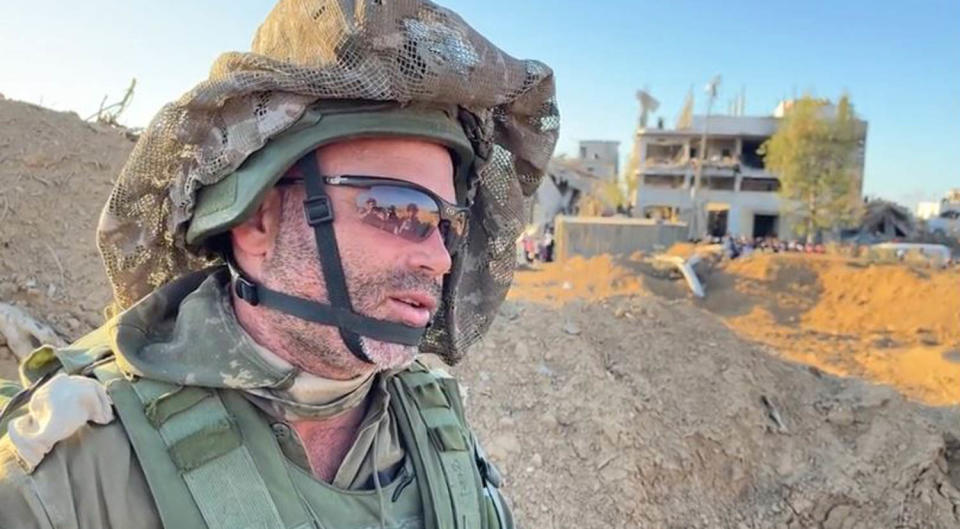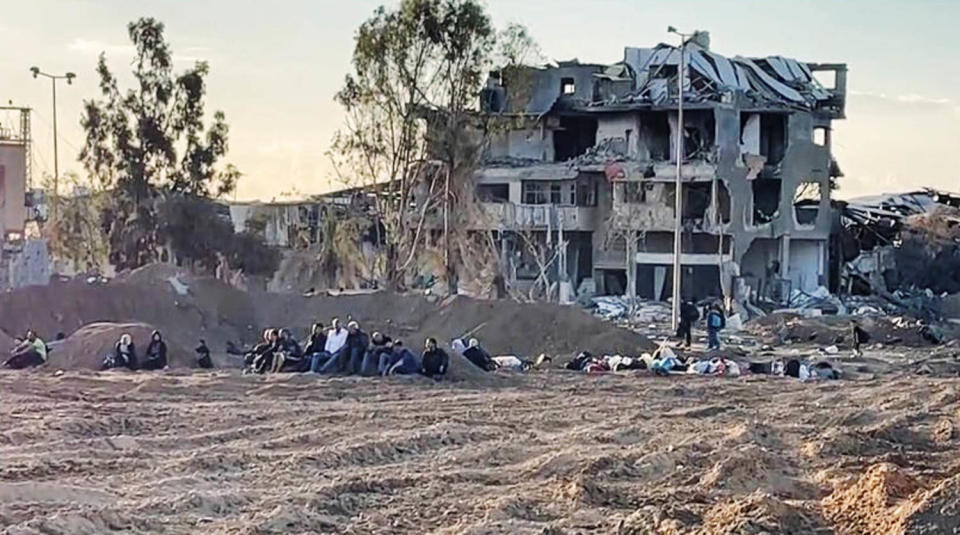Israel calls it a humanitarian corridor, but for fleeing Palestinians, it’s forced displacement
GAZA CITY, Gaza Strip — On the eastern edge of Gaza City, hundreds of families march down Salah al-Din road as the sun begins to set Wednesday afternoon. Many carry babies and small children, while others push the elderly in wheelchairs. Some wave large white flags, while all carry what few possessions they can on a journey with no clear end in sight.
“There’s tens of thousands of people leaving their neighborhoods in Gaza coming through here going south,” said Maj. Shraga of the Jerusalem Brigade, whose last name the Israel Defense Forces asked to be withheld for security reasons.
NBC News was given access to Gaza City on Wednesday to see the main evacuation route that thousands of Palestinians have taken to move south amid Israel’s offensive in the wake of Hamas’ Oct. 7 attack. For operational security reasons required to accompany the Israeli troops into Gaza, NBC News agreed to share raw video with the IDF and blur the faces of junior soldiers. It did not allow the IDF to view any completed articles.

Israel has said its evacuation routes from northern Gaza are designed to get Palestinian civilians to safety, which it says is proof of its commitment to protect innocents even as it targets Hamas. More than 11,200 people have been killed during Israel’s offensive in Gaza since Hamas’ attack on Israel, according to the Gaza Health Ministry, which is controlled by Hamas.
But for many of the more than 1.6 million people who the United Nations agency for Palestinian refugees, UNRWA, says have already been displaced in Gaza since the conflict began, the route feels like a forced displacement.
Some who have journeyed north to south have described horrors along the way, including walking past corpses and dismembered body parts, and hearing the sounds of intense warfare nearby. UNRWA has said many are “exhausted and dehydrated” after having made the trek “amid unusually high temperatures.”
Tarik Yaghi, who said he was studying IT at the Islamic University of Gaza before the conflict began, recently told NBC News about his trek fleeing from northern Gaza to the south.
"The journey was not even a journey," said Yaghi, 23. "It was basically torture.” He said he saw tanks and "bodies thrown left and right," including "dead children."

Asked how he feels seeing children among those fleeing, Maj. Shraga said he does “think about that sometimes.”
“But I’m also very proud of what we’re doing. I’m very proud these innocent children, instead of being in their homes, without any protection, without safe homes, then they have access to leave the town,” he said.
“I know that when you look around, it looks like there was a lot of fighting — there was — but the responsibility for that is on Hamas that brought hell into our homes and brought us in full force down over here,” he said, referring to Hamas’ Oct. 7 attack, which, according to Israeli officials, killed 1,200 people and left dozens as hostages.
As masses of people flee northern Gaza, Israeli troops from the Jerusalem Brigade have been trying to spot any of Hamas’ hostages.
Shouting into megaphones in Hebrew, soldiers call out to the crowd, asking whether there are any Israeli hostages among them and telling them to wave their arms and shout if they are being smuggled into the south.
“We haven’t seen any of the hostages yet, but I’m really hoping that any time we’ll pull out hostages,” Maj. Shraga said, adding that it was “heartbreaking” to hear soldiers call out for any signs of them.
He also said the military was screening people as they walked along the evacuation route, but he would not expand on what technologies were being used. “We’re looking for specific people,” he said.
Maj. Shraga said he understood that for many Palestinians in Gaza who have lost their loved ones, their homes and the lives they once knew, Israeli forces will be seen as the reason for their suffering.
“Hopefully, with a different leadership other than Hamas, these Palestinians here could have a much better life, which is what we’re hoping for,” he said.
“I’m pretty sure that once we’re finished with our job of totally eliminating Hamas, then these people here, the ones who want to live peaceful, productive lives, will be able to come here and prosper beside us,” he said.
Asked whether Israel could guarantee that displaced Palestinians will be able to return to their homes one day, IDF Maj. Doron Spielman said: “I think that will really be in the hands of many different players, and one of the main ones is going to be Hamas.”
Raf Sanchez reported from Gaza City and Chantal Da Silva from Tel Aviv.
This article was originally published on NBCNews.com

